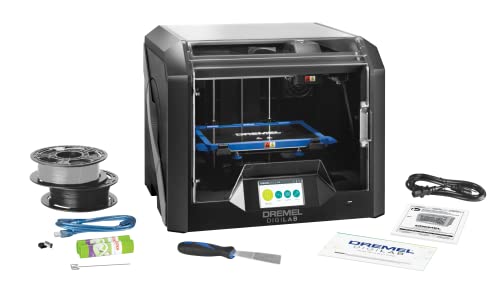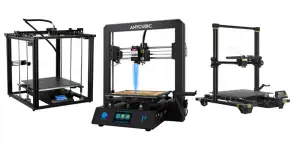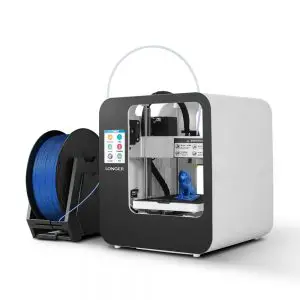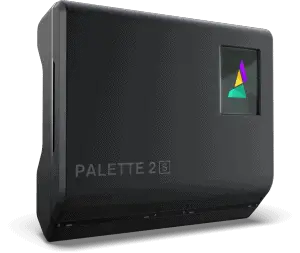The Dremel Digilab 3D45 3D printer is a well-received, reliable, moderately priced machine suited for experienced 3D users, hobbyists and educational institutions. It will not slow or shut down during heavy demand, so students or trainees can submit and put the final touches on their creations with minimal downtime.
Before we break down the pros and cons, features, and capabilities of the 3D45, here are the relevant tech specs.
Dremel Digilab 3D45 Technical Specifications
- Max print size: 10” x 6” x 6.7” (254mm x 154mm x 170mm).
- File format: CAD file (.STL); also supports OBJ files
- Supported filament types: Dremel PLA*; ECO_ABS**; Nylon**;
- Filament diameter: 1.75 mm only, per Dremel documentation
- Printer speed: between 50 and 60 mm/second
- Extruders: one
- Extruder diameter: 0.4 mm nozzle
The printer plate is heated and helps prevent warping. During a build, the build platform can reach a temperature of up to 212 degrees Fahrenheit. The single extrusion extruder can reach up to 536 degrees Fahrenheit.
*Dremel PLA is compatible with all Dremel digital printers
**ECO_ABS and nylon are advanced filaments, compatible with 3D45 but not other Dremel models
Design and Features
The Dremel Digilab 3D45 is an enclosed printer, which enhances safety by limiting accidental access to moving extruders and heated surfaces during builds. This is a bonus for schools, where curious young hands may stray into the wrong area. It also makes the printer quite durable and resistant to external damage.
A clear plastic lid and swinging front door allow you to watch the extrusion process and stop the machine in case of filament misalignment or a similar problem. A mishap is unlikely, but not impossible, so the viewable inner workings help bring peace of mind.
To make the printer even more school-friendly, Dremel added the ability to connect the printer to building ventilation systems. Dremel also included a VOC filter to catch potentially harmful gas byproducts of the heated filament.
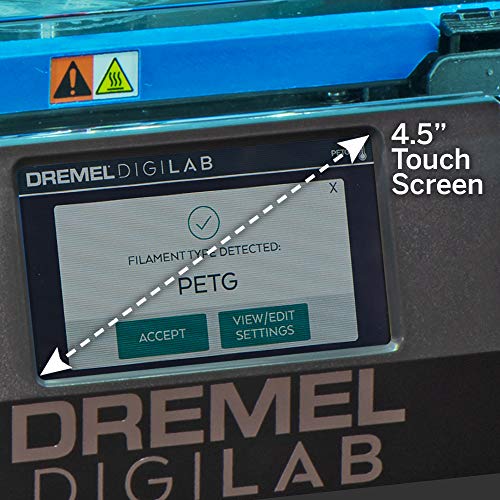
Print farms are another application for the printer. The 3D45 can network with others like it, or with any Dremel model printer. Connectivity is through wifi or ethernet. You can also print using a USB cable or USB drive.
The Dremel Digilab 3D45 is an upgrade to Dremel’s original 3D20, which they released in 2015. The 3D20 was the first of the Dremel Digilab line.
While anyone can use either printer, the 3D45 would also be a great addition for institutions and professional fabricators who have the space and ventilation. At 47 pounds, the high capacity machine is best placed on a sturdy workbench or table surface. With that being said, it’s still a suitable printer for hobbyists who are ready to take on a more mid-range 3D printer or a beginner ready to go all in.
Of course, the dedicated commercial application also means the 3D45 has a higher cost. We were able to find refurbished 3D20 printers, which are fine for residential use, for less than a third of the 3D45’s retail price tag.
Facilities that need consistent high volume printing may be able to get a discount by buying several of the printers at once, with the added advantage that they will all run the same software. A crafty shop owner could save time by keeping three networked printers loaded and ready to work, with a different type of filament in each.
The aesthetic of the 3D45 isn’t as futuristic as its capabilities. While not blocky or clunky, it doesn’t have rounded human hand-friendly surfaces either. With the clear front door and front control panel, it reminded us of an oversized toaster oven housed in a printer body. But who said you had to have the most beautiful 3d printer on the block anyway?
Printing
For all its charms and quirks, the 3D45 won’t be much use to you if it doesn’t print to the level of quality and standards you need. Every printer is not suitable for every user.
One of the key areas this printer shine is print quality. Though not made for stealth, the printer is quiet enough not to intrude on others’ work tasks while in operation. The output is consistent, with no warping or uneven features. The printing process is straightforward enough that this could be the first printer for a novice or fledgling designer. You have a choice between standard and high resolution, with little noticeable difference in the final product.

The Dremel Digilab 3D45 will print heavily contoured objects, like costume pieces, consistently and with fidelity. You should not experience discoloration or uneven tone. If you do, the manual or Dremel tech support will help you identify the problem. Often, you can tweak a setting or try a different filament if you are unsatisfied with the color distribution. Settings are necessarily complex, but even young users can learn quickly.
The ease of use and excellent print quality help make the printer a wise choice for professionals who must design and print at a high volume. It won PC Mag’s Editor’s Choice Award for its price range. The cost is more than some similar competing models, but those printers do not offer the surface area or print/build quality of the Digilab 3D45. It seems that Dremel took everything they learned in making handheld power tools, and applied it to their growing new line of 3D printers.
What comes with the Dremel Digilab 3D45?
The printer ships in a cardboard box, with a shipping weight of around 50 pounds. You remove two cardboard inserts that resemble egg cartons and protect the printer during transport. More protective insulation is placed inside the printer and is easy to remove. We caution against using a screwdriver or a similar tool when removing the inner packaging.
You get the following components when you purchase the 3D45 online or from a brick and mortar retailer:
- The Dremel Digilab 3D45 3D printer
- An instruction manual (also available online)
- A Quick Start guide that walks you through setup quickly
- A filament spool. Dremel doesn’t say which type of filament, but our guess would be nylon and not one of the specialty filaments.
- A DC power cable adapter
- A USB cable
- A glue stick
- Object removal tool, for safely removing jammed or stuck printouts
- USB flash drive
- An unclog tool, which is like a tiny auger for the delicate extruder nozzles which can become clogged.
Powering up the printer is easy, and Dremel has a EULA you must sign that appears on the console. The most challenging step, for first time users, will be threading the filament onto the spool holder and into the extruder intake. You also have to level the build platform using the glue stick. We didn’t try out this process, but the directions are easy to read and follow.
Support
Dremel customer service is solid and trustworthy, according to most reviewers. If you need help, you can call the support line or use Dremel’s convenient live chat feature on their website. There is a dedicated department to support Digilab products. We had no trouble finding the support documentation we needed for this review.
The warranty is one year for educational and non-commercial use, 60 days for commercial users. The warranty covers “defective materials or workmanship.” Be sure to keep all your receipts, documentation, and the original packaging with your purchase. You will need it to ship the printer back to Dremel’s central service center.
The printer firmware contains several open source software components. The manual states that the open source GNU license software is not covered under the warranty. You can get a copy of the GNU source code by writing to an address contained in the manual.
Pros & Cons of the Dremel Digilab 3D45
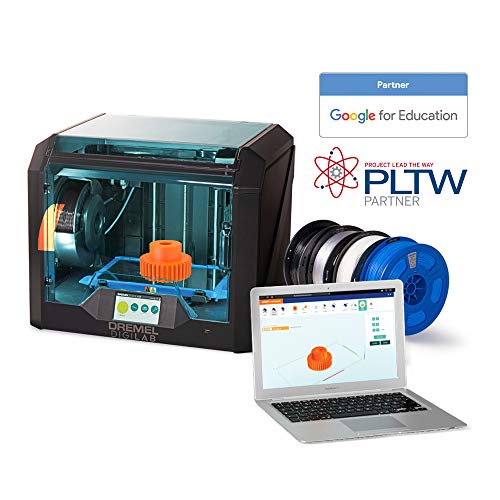
Pros:
- Uses newer style filaments (Dremel calls these “advanced filaments”)
- Working parts are completely enclosed for safety
- Can keep up with the volume of most educational institutions
- Operates quietly and won’t disrupt others in shared workspace
- Uses a built-in VOC filter, and can also hook up to most ventilation systems
- Construction and 48-pound weight make the printer stable during builds
- Dremel includes basic sample projects you can try, in the manual
- Documentation is easy to find and thorough
Cons:
- Warranty only good for sixty days for commercial users
- Entire unit has to be returned for warranty work (Dremel pays freight)
- More expensive than similarly featured competitors; closest competitor lacks a closed frame
Verdict
We strongly recommend the Dremel Digilab 3D45 3D printer for residential or light commercial/institutional users who need a consistent moderate volume of flawless digital builds. Dremel made this printer easy to use, so beginners can become makers with a bit of training and supervision. The printer is significantly more expensive than even similar Dremel products but is worth the money if you know you will use it consistently.
Last update on 2025-06-11 / Affiliate links / Images from Amazon Product Advertising API

